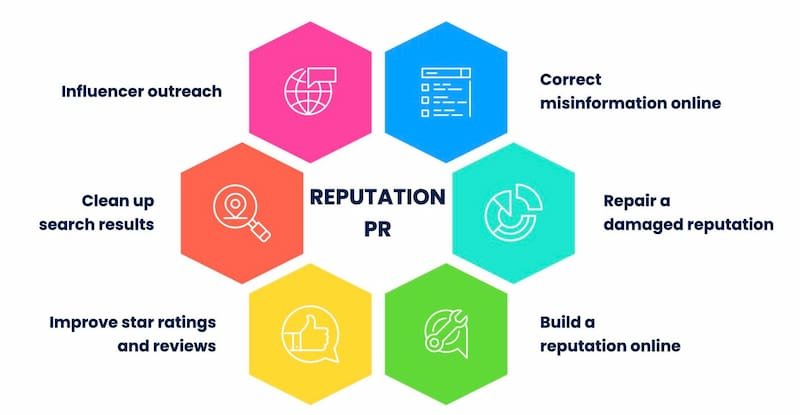In the digital age, a strong online reputation is essential for the success of any business or individual. Public relations (PR) plays a crucial role in shaping and maintaining this reputation. A well-executed PR strategy can help you manage your online presence, build trust with your audience, and protect your brand from potential crises. This blog post will explore how to use PR to build a strong online reputation and offer actionable tips to help you achieve success.
1. Understanding the Importance of Online Reputation
Your online reputation is how others perceive your brand on the internet. It is influenced by everything from customer reviews and social media interactions to news articles and blog posts. Here’s why it matters:
- First Impressions: For many potential customers or clients, the first encounter with your brand will be online. A positive online reputation can make a strong first impression.
- Trust and Credibility: A strong online reputation builds trust and credibility. People are more likely to do business with brands that have a positive online presence.
- Crisis Mitigation: A solid reputation can serve as a buffer during crises. If your brand is well-regarded, people may be more forgiving when issues arise.
2. Key PR Strategies for Building an Online Reputation
To build and maintain a strong online reputation, it’s essential to implement the following PR strategies:
- Content Creation and Management: Regularly publish high-quality content that reflects your brand’s values and expertise. This could include blog posts, videos, podcasts, and social media updates. Engaging content not only improves your online presence but also positions your brand as a thought leader in your industry.
- Social Media Engagement: Actively engage with your audience on social media platforms. Respond to comments, address concerns, and participate in relevant conversations. Social media is a powerful tool for building relationships and managing your brand’s image in real time.

- Media Relations: Cultivate relationships with journalists, bloggers, and influencers in your industry. Positive media coverage can significantly boost your online reputation. A well-crafted press release or an interview in a reputable publication can enhance your brand’s credibility.
- Search Engine Optimization (SEO): Optimize your content and online profiles to ensure they rank highly in search engine results. Positive information about your brand should be easy to find, while negative content should be buried.
- Online Reviews and Testimonials: Encourage satisfied customers to leave positive reviews and testimonials on platforms like Google, Yelp, and industry-specific sites. Respond to negative reviews professionally and try to resolve any issues. Genuine customer feedback can have a significant impact on your online reputation.
3. Monitoring Your Online Presence
Building a strong online reputation requires constant monitoring. Here’s how to stay on top of what’s being said about your brand:
- Google Alerts: Set up Google Alerts for your brand name, key products, and relevant industry terms. This will notify you whenever your brand is mentioned online, allowing you to respond quickly to both positive and negative comments.
- Social Media Listening Tools: Use social media listening tools like Hootsuite, Mention, or Sprout Social to track mentions of your brand across social media platforms. These tools can help you identify trends, gauge public sentiment, and engage with your audience more effectively.
- Reputation Management Services: Consider using reputation management services that specialize in monitoring and improving your online reputation. These services can provide detailed reports and offer strategies for addressing any issues that arise.
4. Handling PR Crises Online
Even with a strong online reputation, PR crises can happen. How you handle them can make or break your brand’s image. Here are some tips:
- Be Proactive: Address issues as soon as they arise. Delaying a response can allow the situation to escalate.
- Apologize Sincerely: If your brand is at fault, issue a sincere apology. Acknowledge the mistake, take responsibility, and outline the steps you’re taking to fix the issue.
- Communicate Transparently: Keep your audience informed throughout the crisis. Provide regular updates and be transparent about what’s happening. This builds trust and shows that your brand is handling the situation responsibly.
- Learn and Adapt: After the crisis is resolved, analyze what went wrong and how it was handled. Use these insights to improve your PR strategies and prevent similar issues in the future.
5. Maintaining a Positive Online Reputation Over Time
Building a strong online reputation is an ongoing process. To maintain it, you need to be consistent and proactive:
- Regularly Update Content: Keep your website, blog, and social media profiles up to date with fresh content. Regular updates show that your brand is active and engaged.
- Engage with Your Audience: Continuously interact with your audience, even when there’s no immediate crisis. This builds a solid relationship and keeps your brand top-of-mind.
- Review and Adjust Your PR Strategy: Periodically review your PR strategy to ensure it’s still effective. The digital landscape is always changing, and your strategy should evolve with it.
Conclusion
In today’s digital world, a strong online reputation is vital for success. By implementing effective PR strategies, consistently monitoring your online presence, and proactively managing crises, you can build and maintain a reputation that strengthens your brand and fosters trust with your audience. Remember, your online reputation is a valuable asset—invest in it wisely.




